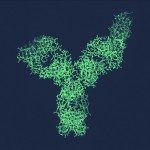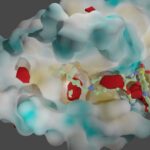Lien vers Pubmed [PMID] – 23840299
PLoS ONE 2013;8(6):e63730
Pockets are today at the cornerstones of modern drug discovery projects and at the crossroad of several research fields, from structural biology to mathematical modeling. Being able to predict if a small molecule could bind to one or more protein targets or if a protein could bind to some given ligands is very useful for drug discovery endeavors, anticipation of binding to off- and anti-targets. To date, several studies explore such questions from chemogenomic approach to reverse docking methods. Most of these studies have been performed either from the viewpoint of ligands or targets. However it seems valuable to use information from both ligands and target binding pockets. Hence, we present a multivariate approach relating ligand properties with protein pocket properties from the analysis of known ligand-protein interactions. We explored and optimized the pocket-ligand pair space by combining pocket and ligand descriptors using Principal Component Analysis and developed a classification engine on this paired space, revealing five main clusters of pocket-ligand pairs sharing specific and similar structural or physico-chemical properties. These pocket-ligand pair clusters highlight correspondences between pocket and ligand topological and physico-chemical properties and capture relevant information with respect to protein-ligand interactions. Based on these pocket-ligand correspondences, a protocol of prediction of clusters sharing similarity in terms of recognition characteristics is developed for a given pocket-ligand complex and gives high performances. It is then extended to cluster prediction for a given pocket in order to acquire knowledge about its expected ligand profile or to cluster prediction for a given ligand in order to acquire knowledge about its expected pocket profile. This prediction approach shows promising results and could contribute to predict some ligand properties critical for binding to a given pocket, and conversely, some key pocket properties for ligand binding.

